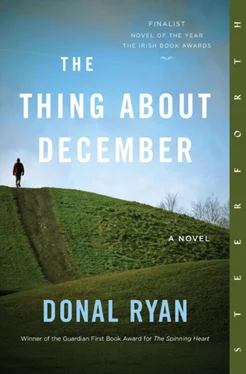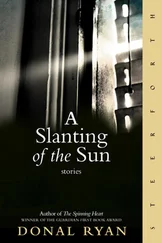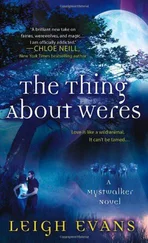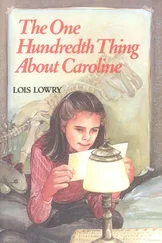They were the bits Johnsey had heard. Putting those bits together in a way that made sense was impossible. Were they all going at her, her father who was given the job by God of protecting her from harm, and her brothers as well? The whole rest of that day, that girl’s suffering rested heavily in the centre of his mind. For a finish, he felt a sort of a weakness from thinking about it, a sickness in his stomach and a woozy feeling in his head, and he had to sit down on a pile of fertilizer bags and try and collect himself before Packie spotted him. Imagine, that jagged, broken broom handle entering her and piercing a little unborn baby and yanking it out, dead and bloody into this world.
Probably it would have been a monster anyway, the red-faced lady said. A monster ? Surely be to God nothing with a baby’s pure, unblemished soul could be a monster? But there was something about that in Johnsey’s mind, something about fathers and daughters and brothers and sisters riding each other. Incest , it was called. If they made a baby it could be a retarded freak or have two heads or worse. But then, Adam and Eve’s children must have done something like that to make the human race grow, and then it must have happened again when only Noah and his family were spared from the Great Flood. Or did God let Noah’s sons’ wives live too? Even then, there would have been first cousins riding. And Johnsey had heard that used as an explanation for more serious cases of gamminess or spastication: Yerra sure, weren’t his parents first cousins?
FOR A MAN to be lonely, Johnsey knew, he did not need to be alone. People often took his hand and shook it and held on to it in the co-op, and stood reminiscing about one or both of his parents while his face burned and his other hand searched vainly for somewhere to put itself. You could be lonely even then, with a person actually standing right there in front of you, clutching your hand, saying things to you. A couple of days, it seemed there was a queue of such people. Some of them had been at the funeral but thought it would be nice to have another go at shaking his hand and telling him he was after getting an awful time of it, and he was to call up any time, any time at all, they were always at home. Their door was always open. He’d like to see their faces if he actually strolled in through their door. Hello! Here I am, as invited! I’ll ate me dinner now and have a cut of tart after it and a couple of bottles of stout and maybe have a good feel of that young lady over there, is that yer daughter , bejaysus she’s a fine girl now, and I’ll be on my way again! Woo-hoo!
They’d have a hairy conniption if he as much as set foot in their yards. Why did people go around saying things they didn’t mean?
THERE WAS an old fella, his name was Quigley, used to live away over the road and down past the small bridge and on past the weir, over towards the stud farm owned by the Black Protestant Shires. The Shires had old money. That was more valuable than new money. This old fella had a small bit of land tucked up to the side of the Shires’s walled-off ranch. He was a wild-looking man, with great clumps of hair sticking out from the side of his head and from under his cap. He wore a greatcoat tied with baling twine all year round, and Wellington boots coated with slime that he fermented all over his yard. On purpose, just to spite the Proddies, Daddy used to say, good Catholic shite. When Johnsey was small that man of the Quigleys would cycle on up the road past their gate, and he’d always have a big cheery wave, and he’d go all the way out as far as Clonvourneen. Every single evening without fail, come rain, hail, sunshine or storm, he’d make that trip. He’d pedal his old creaky, squeaky, rusty pushbike all those miles out and all those hard miles home to visit an old uncle of his who was being subvented in the nursing home out there. He’d sit beyond with him and they’d have a chat and a brandy and he’d fix his old uncle up for the night and see that he was comfortable. Daddy said he was only doing it so that when the old uncle died, he’d leave him everything. For a finish, after all the thousands of miles cycled, and all the elements braved, the man died before his uncle. The fucker outlasted him.
Daddy always said that that man did what he did out of avarice , and Johnsey believed that then, because when Daddy said a thing it was invariably true. But now, Johnsey was not so sure. Maybe he did it to have somewhere warm to sit of an evening, with someone familiar to look at and be silent beside in comfort. Maybe he knew that was worth more than a farm of land or a big pile of second-hand money, covered in the dirty prints of other men’s hands.
DADDY WOULD LEAVE the cattle out of the slatted house at the start of April. They’d think they were going to be milked and they’d queue up like fools at the milking-parlour door. Then Mother and Daddy and Johnsey would hunt them up the yard towards the long acre and they’d be looking back with their big scared eyes as much as to say Are ye sure? Are we really allowed out here? Mother would say Look at the auld eejits, go on, ye auld dotes, and the three of them would watch as one brave auld campaigner would mosey off in to the grass and the rest would get courage from her and follow on. Friesians are pure gentle auld crathurs. If they were Limousins, Daddy would say, they’d trample you to get to the field. They’d knock the feckin wall!
DERMOT McDERMOTT called up to the house at the start of that April. It was a Monday evening. Johnsey brought him in to the kitchen. When you came in through the front porch and into the hall, you could turn left into the kitchen or right into the front room, the good room. There was no way that curly prick was tramping his dirty rotten boots in around Mother’s good room that she fussed over for so many years and was forever tightening up for fear anyone would call. He’d probably sneer to himself at the pinkness and frilliness of the cushions and the lacy yokes Mother put over the backs of the couch and armchairs. And the picture in pride of place on the wall above the fireplace of Daddy and Mother and Johnsey, taken when he was a small boy by a professional photographer inside in town, with his hair all combed back and his good-wear clothes on him. Dermot McDermott would probably have a great time describing it all to his bigshot people. But then, they’d probably all done their fair share of nosing about the place when Mother and Daddy died. They’d surely been in the stream of people that had flowed in and out to offer their condolences and pay their respects. Johnsey couldn’t properly remember; those two sets of days were like dreams you only have a half a hold of when you wake.
What kind of dealings would he be made part of? Would he have to make a decision or give permission for something or talk about the lease on the land or agree to a right of way or some such adult thing that Daddy or Paddy Rourke or even Mother would be able to sort out with a wave of a hand and a few small words? When they spoke that way the unaccustomed listener could go away thinking nothing much had been said, but in those brief conversations not a word was wasted, each utterance contained a world of meaning. Dermot McDermott had never said a bad word to Johnsey — he had never said many words to Johnsey at all — it was a way that he had of not looking at you, or looking around while he was talking to you, like you were not quite deserving of his attention, so he would examine the countryside all about until you were gone away and had stopped usurping his precious time. At least he wouldn’t be bullshitting about calling up and calling down and doors being always open and other such lies people think are truths while they’re saying them.
Читать дальше











